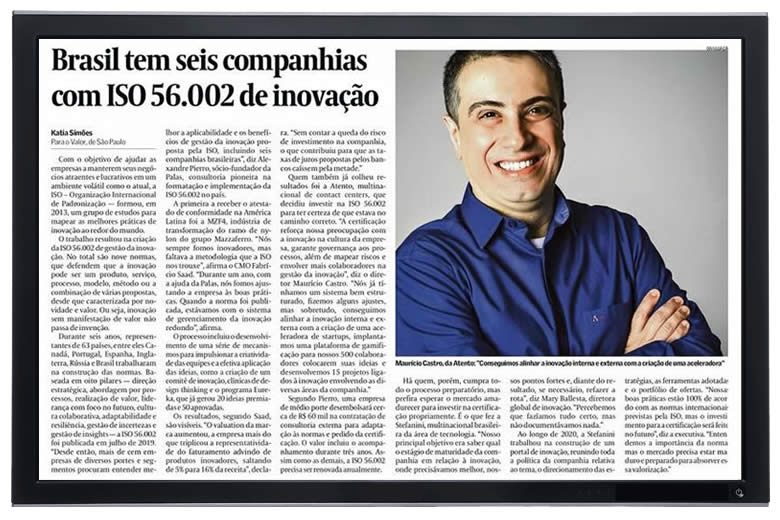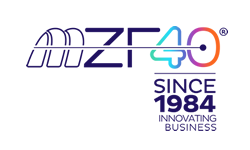Pioneering innovation in Brazil
Brazil has six companies with iso 56002, innovation management
(Kátia Simões for Valor newspaper – São Paulo)
In order to help companies keep their businesses attractive and profitable in today’s volatile environment, ISO – International Organization for Standardization – formed a study group in 2013 to map the best innovation practices around the world.
The work resulted in the creation of ISO 56002 for innovation management. In total there are nine norms, which defend that innovation can be a product, service, process, model, method or the combination of several proposals as long as it is characterized by novelty and value. In other words, innovation without manifestation of value is just invention. For six years, representatives from 63 countries, including Canada, Portugal, Spain, England, Russia and Brazil, worked on building the standards. Based on eight pillars – strategic direction, process approach, value realization, leadership with a focus on the future, collaborative culture, adaptability and resilience, uncertainty management and insight management – ISO 56002 was published in July 2019. Since then, more than one hundred companies of different sizes and segments have sought to better understand the applicability and benefits of innovation management proposed by ISO, including six Brazilian companies”, says Alexandre Pierro, founding partner of Palas, a pioneering consultancy in the formatting and implementation of ISO 56,002 in the country.
The first to receive the certificate of conformity in Latin America was MZF4, the Mazzaferro group’s nylon branch transformation industry. “We’ve always been innovative, but we lacked the methodology that ISO brought us”, says CMO Fabrício Saad. For a year, with the help of Palas, we adjusted the company to good practices. When the standard was published, we had the innovation management system in place,” he says. The process included the development of a series of mechanisms to boost the teams’ creativity and the effective application of ideas, with the creation of an innovation committee, design thinking clinics and the Eureka program, which has already generated 20 awarded ideas and 50 approved.
The results, according to Saad, are visible. “The brand’s valuation increased, the company more than tripled the representativeness of revenues from innovative products, jumping from 5% to 16% of revenue”, he declares. Not to mention the drop in investment risk in the company, which contributed to the interest rates proposed by banks falling by half.”
Atento, a multinational contact center company that has already reaped results, decided to invest in ISO 56002 to make sure it was on the right path. “The certification reinforces our concern with innovation in the company’s culture, guarantees governance of processes, in addition to mapping risks and involving more employees in innovation management”. says director Maurício Castro. “We already had a well-structured system, we made some adjustments, but above all, we managed to align internal and external innovation with the creation of a startup accelerator, we implemented a gamification platform for our 500 employees to post their ideas and we developed 15 projects related to innovation involving the various areas of the company.”
According to Pierro, a medium-sized company will spend around R$ 60,000 to hire an external consultant to adapt to the norms and apply for certification. The amount includes follow-up for 3 years. Like the others, ISO 56002 needs to be renewed annually.
There are those, however, who complete the entire preparatory process, preferring to wait for the market to mature before investing in certification itself. That’s what Stefanini, a Brazilian multinational in the field of technology, did. “Our main objective was to find out the company’s stage of maturity in relation to innovation, where we needed to improve, our strengths and, given the result, if necessary, redo the route”, says Mary Ballesta, global director of innovation. “We realized we were doing everything right, but we weren’t documenting anything.”
Throughout 2020, Stefanini worked on building an innovation portal, bringing together the company’s entire policy on the subject, the direction of strategies, the tools adopted and the portfolio of offers. “Our good practices are 100% in accordance with the international standards established by the ISO, but the investment for certification will be made in the future”, says the executive. “We understand the importance of the standard, but the market needs to be mature and prepared to absorb this appreciation.”

Published in Valor Econômico newspaper on August 31st, 2021:
valor.globo.com/publicacoes/suplementos/noticia/2021/08/31/brasil-tem-seis-companhias-com-iso-56-002-de-inovacao.ghtml


